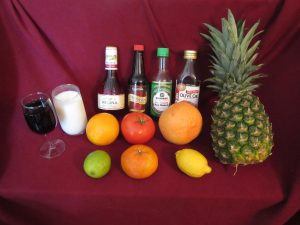
Any acid-based liquid will make a good marinade, such as the juice from several citris fruits, tomato or pineapple juice, milk or wine.
WHY MARINATE WILD GAME MEAT? Some people get upset when “it doesn’t taste like beef.” Well, why should it. Beef is beef. Venison is venison. (And elephant is elephant, for that matter.) Other people object to a strong or ‘different” odor in wild game meat. So open a window and/or turn on a fan if it bothers you that much.
Marinating is mainly a method of tenderizing. Marinating also can get rid of gamey odors or mask them, because now and then they do exist even when they shouldn’t. (Maybe the animal wasn’t processed properly.)
When using commercial marinades, follow package directions.
A fair number of people believe bear meat has a bit of “strong” taste — for want of a better term. My wife is one of those people. I am not. If there is a stronger taste than you like, marinating the meat will add a flavor you like. There are some options.
Use acid-based liquids as a marinade base, such as dairy products, citrus juices (orange, lemon, lime, grapefruit, clementines, tangerines), tomato juice, pineapple juice, Italian salad dressing, vinegar and wine. Acidic liquids help break down cell walls, tenderizing the meat, in effect. Be aware, however, if you marinate the meat too long, you overdo it and the meat will be so broken down it will be mushy on the surface.
The naturally highly acid content of tomato juice will neutralize strong odors — that’s why we’re advised to wash dogs sprayed by a skunk in it — and it also helps tenderize meat.
Many berries, except blueberries, contain naturally occurring citric acid. Berries with higher amounts of citric acid include strawberries, raspberries, cranberries, red and black currants, and gooseberries.
Stone fruits, such as cherries, peaches and apricots, also contain citric acid.
Wine is Fine
Wine works well in many wild game recipes (and in many wild game cooks). Wine can be a meat tenderizer in a meat marinade, or it can be a seasoning. Wine is as easy to use as salt and pepper, and it brings food flavors together in interesting ways. The alcohol evaporates as the wine cooks, leaving only the fine flavor. So it can be used in any family recipe.
To use wine in recipes that don’t call for it, just substitute it for part of the other liquids called for.
Use a good table wine in your cooking instead of a cooking wine. You will like the results better. Red meats can be cooked with red wine; the wines generally have more robust flavors.
After it is marinated, cook bear meat as you would beef. As with most cooking, a bit of experimentation may be necessary to find the preparation methods, marinades and recipes you prefer.
Be sure not to overcook bear meat. Bear meat and pork are the only meats that must be cooked to an internal temperature of 170 degrees Fahrenheit, which makes them well done (not the same as overcooked) to eliminate the possibility of trichinosis.
Marinating Notes:
1) If a marinade is used on meat and drained off, then reused to baste the meat during cooking, the marinade must be heated to the boiling point for 1-2 minutes before it is reused. Bacteria from the meat could be in the marinade and make it unsafe if it isn’t reheated.
2) No matter which marinade you use, cover the meat and refrigerate it for the entire marinating process.
3) Foods can be marinated up to 48 hours, but 24 hours usually is long enough for the marinade to penetrate the meat, thus adding flavor. Marinate meat at least four hours; eight hours is better.
4) When using commercial marinades, follow instructions on the package.
5) Do not cut chops or steaks until ready to marinate or cook. Any cut creates water loss from the meat; the earlier the cuts, the more the meat will have dried before you’re ready to work with it.
 This marinating material was taken from the book THE BEAR HUNTING OBSESSION OF A DRIVEN MAN, pages 154-155, in the chapter titled Bear on the Table. To order the book, click here.
This marinating material was taken from the book THE BEAR HUNTING OBSESSION OF A DRIVEN MAN, pages 154-155, in the chapter titled Bear on the Table. To order the book, click here.
Soy Sauce Marinade
2 C. soy sauce 2 C. water
1 lemon, sliced
1 medium to large onion, sliced
1 tsp. sugar (to offset salty taste of soy sauce, or use low sodium soy sauce
Mix all ingredients together. Marinate meat in sauce at least four hours in a self-sealng plastic bag. The longer it marinates the better. This is especially good for chicken. Drain marinade off and save. When cooking chicken, put on grill and bring remaining marinade to a boil for 1 minute. When chicken starts to get hot, remove it from grill. Place chicken back in marinade and let stand 1-2 minutes, then place it back on grill. Repeat 2-3 times until chicken is done.
Bob Dilley, Forsyth, MT
Guamanian Marinade For BBQ Chicken
2 cloves garlic, chopped or minced 1/2 onion, chopped
1/4 tsp. MSG (can be omitted) 1 tsp. salt
1/4 tsp. black pepper 1/2 C. vinegar
1/2 C. soy sauce
Mix all ingredients together. Marinate chicken or wild white meat (grouse) for at least 2 hours. Remove meat from marinade and grill or broil it.
Recipe submitted by Vince Flores, Milwaukee, WI
Marinated Creamy Grilled Round Roast
1 (16 oz.) bottle creamy Italian dressing (regular or zesty)
1/4-1/3 C. soy sauce 1 or 2 Tblsp. liquid smoke (optional)
1/4-1/3 C. Worcestershire sauce
1 2 to 3 lb. venison round roast
Mix all liquids together, cover roast and poke with fork to let in all the juices. Let it set for 24 hours in the refrigerator. Turn and poke meat at 12 hours (mixture will cover roast if you have a deep, narrow bowl or use double plastic bags). Remove meat from marinate but keep marinade. Heat remaining marinade to the boiling point. Light grill. Baste and turn meat frequently. Grill for 20-30 minutes depending upon size of the roast. Any leftover marinade can be served at the table for dipping the meat. Serves 4-6.
Recipe submitted by Gary A. Lucas, Powell, OH

